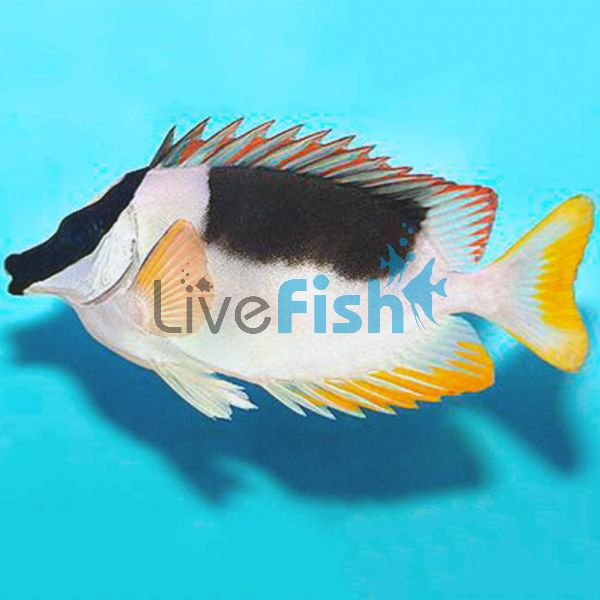Magnificent Rabbitfish - Medium
The Magnificent Rabbitfish is one of the more colourful of its family. It has distinctive rabbit-like facial features along with a black band running down it. Its body is half white and half brownish-black and its fins are fringed with either red or yellow. It has venomous spines so be careful when handling it but this does mean that larger predatory fish will generally leave it alone.
The Magnificent Rabbitfish is one of the more colourful of its family. It has distinctive rabbit-like facial features along with a black band running down it. Its body is half white and half brownish-black and its fins are fringed with either red or yellow. It has venomous spines so be careful when handling it but this does mean that larger predatory fish will generally leave it alone.
These fish have proven hard to study and as such, no known differences have been noted between males and females and breeding in captivity has been unsuccessful so far.
This species is originally found only in the Andaman sea but has been spotted from the Similian Islands all the way over to Java in Indonesia. They have been found down at depths of 20 metres and are normally either seen in pairs or on their own inhabiting coral-rich reef areas.
Tank Recommendations for the Magnificent Rabbitfish
The smallest tank size for these fish is 280 litres. They will do well in both Fish Only with Live Rock and Reef environments. Provide plenty of live rock which they will use for grazing and hiding spots. This species is hardy and can tolerate quite a range of water parameters. Be sure to establish plenty of wide-open swimming areas to get the most enjoyment from this fish.
Suitable Tank Buddies
This is a peaceful species of fish and will get along with most other species as long as they don't try to eat it. Because of its venomous spine, most other fish will respect and stay away from it. The Magnificent Rabbitfish has been known to chase away herbivores if it isn't sufficiently fed.
Usually Compatible
Butterflyfishes, Batfish, Damselfish and Clownfish would make great choices to combine with this fish. Other wonderful tank buddies could include Tangs, Cardinalfish and Squirrelfish. They should also get along great with Pufferfish and Parrotfish. Boxfish, Filefish, Groupers and Grunts would be great options too.
Sometime Compatible
They will nip and pick at certain species of soft corals so choose them wisely. They have also been known to sometimes pick at small species of invertebrates. The same goes for crustaceans.
Rarely Compatible
Stay well away from sharks with this one as they will most definitely see the rabbitfish as food. Avoid housing more than one of these species in the same tank too, as they will become territorial and show aggression. These are quite active animals, so docile species such as Pipefish and Seahorses may be too frightened to come out and feed.
Feeding your Magnificent Rabbitfish
This species of fish are natural omnivores but also excellent grazers of algae from live rock. You should offer them a varied mix of flake, frozen and live foods along with nori seaweed in case there isn't enough algae growth in your tank. The Magnificent Rabbitfish is not a picky eater so ensure it is well fed at all times or it may start to nip at soft corals and/or small invertebrates. Several feedings a day are essential. Spirulina and Caulerpa may also be offered if insufficient vitamin intake is suspected.
| Scientific Name | Siganus Magnifica |
|---|---|
| Common Names | The Magnificent Rabbitfish is also known as the Magnificent Foxface, the Andaman Foxface and the Red Fin Foxface. |
| Diet | Omnivore |
| Fish Family | Siganidae |
| Lifespan (years) | 6 |
| Max. Length (cm) | 23 |
| Min. Tank Volume (l) | 280 |
| Origin | East Indian Ocean |
| Reef Safe | With Caution |
| Sociability | Peaceful |
| Venomous | Yes |
| Water Conditions | 25-28° C, dKH 8-12, pH 8.1-8.4, sg 1.020-1.025 |




